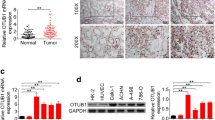Abstract
Flotillin-2 (FLOT2) is a highly conserved protein isolated from caveolae/lipid raft domains that tether growth factor receptors linked to signal transduction pathway. FLOT2 has recently been identified to be involved in tumorigenesis of several cancers such as breast cancer, melanoma, and gastric cancer. However, the role of FLOT2 in renal cell carcinoma (RCC) remains unclear. The expression levels of FLOT2 in RCC patients and renal cancer cell lines were evaluated by quantitative real-time PCR (qRT-PCR) and Western blot. FLOT2 protein expression was also analyzed in archived paraffin-embedded RCC tissues using immunohistochemistry (IHC), and its association with overall survival of patients was analyzed by statistical analysis. Small-interfering RNA (siRNA) was used to suppress FLOT2 expression in RCC cell lines. In vitro assays were performed to further explore its role in tumor progression. The expression level of FLOT2 was higher in RCC tissues and cell lines than in corresponding adjacent normal tissues and normal human proximal tubule epithelial cell line HK-2. IHC analysis revealed high expression levels of FLOT2 in RCC specimens. The RCC patients with higher FLOT2 expression had an advanced clinical stage and poorer prognosis than those with lower FLOT2 expression. FLOT2 expression was an independent prognostic marker of overall RCC patient survival in a multivariate analysis. In vitro assays indicated that knockdown of FLOT2 reduced cell proliferation, migration, and invasion. Our data suggest that FLOT2 is a novel molecule involved in RCC progression, which provide a potential prognostic biomarker and therapeutic target.




Similar content being viewed by others
References
Rini BI, Campbell SC, Escudier B. Renal cell carcinoma. Lancet. 2009;373(9669):1119–32.
Yang FQ, Yang FP, Li W, et al. Foxl1 inhibits tumor invasion and predicts outcome in human renal cancer. Int J Cli Exp Pathol. 2014;7(1):110.
Ljungberg B, Cowan NC, Hanbury DC, et al. EAU guidelines on renal cell carcinoma: the 2010 update. Eur Urol. 2010;58(3):398–406.
Cohen HT, McGovern FJ. Renal-cell carcinoma. N Engl J Med. 2005;353(23):2477–90.
Hollingsworth JM, Miller DC, Daignault S, et al. Five‐year survival after surgical treatment for kidney cancer. Cancer. 2007;109(9):1763–8.
Babuke T, Tikkanen R. Dissecting the molecular function of reggie/flotillin proteins. Eur J Cell Biol. 2007;86(9):525–32.
Staubach S, Hanisch FG. Lipid rafts: signaling and sorting platforms of cells and their roles in cancer. Expert Rev Proteome. 2011;8(2):263–77.
Márquez DC, Chen HW, Curran EM, et al. Estrogen receptors in membrane lipid rafts and signal transduction in breast cancer. Mol Cell Endocrinol. 2006;246(1):91–100.
Banning A, Kurrle N, Meister M, et al. Flotillins in receptor tyrosine kinase signaling and cancer. Cells. 2014;3(1):129–49.
Perou CM, Sørlie T, Eisen MB, et al. Molecular portraits of human breast tumours. Nature. 2000;406(6797):747–52.
Hazarika P, McCarty MF, Prieto VG, et al. Up-regulation of Flotillin-2 is associated with melanoma progression and modulates expression of the thrombin receptor protease activated receptor 1. Cancer Res. 2004;64(20):7361–9.
Berger T, Ueda T, Arpaia E, et al. Flotillin-2 deficiency leads to reduced lung metastases in a mouse breast cancer model. Oncogene, 2012
Wang X, Yang Q, Guo L, et al. Flotillin-2 is associated with breast cancer progression and poor survival outcomes. J Transl Med. 2013;11(1):190.
Cheng YX, Hu M, Chen L, et al. The mechanism of lipid raft mediating chemoresistance of cervical cancer. Saudi Med J. 2012;33(5):508–14.
George KS, Wu S. Lipid raft: a floating island of death or survival. Toxicol Appl Pharmacol. 2012;259(3):311–9.
Ji H, Greening DW, Barnes TW, et al. Proteome profiling of exosomes derived from human primary and metastatic colorectal cancer cells reveal differential expression of key metastatic factors and signal transduction components. Proteomics. 2013;13(10–11):1672–86.
Cao K, Xie D, Cao P, et al. SiRNA-mediated flotillin-2 (Flot2) downregulation inhibits cell proliferation, migration, and invasion in gastric carcinoma cells. Oncol Res Featuring Preclinical Clin Cancer Ther. 2014;21(5):271–9.
Conflicts of interest
None
Author information
Authors and Affiliations
Corresponding author
Additional information
Yang Yan, Feng-qiang Yang, and Hai-min Zhang contributed equally to this work.
Rights and permissions
About this article
Cite this article
Yan, Y., Yang, Fq., Zhang, Hm. et al. Up-regulation of flotillin-2 is associated with renal cell carcinoma progression. Tumor Biol. 35, 10479–10486 (2014). https://doi.org/10.1007/s13277-014-2343-9
Received:
Accepted:
Published:
Issue Date:
DOI: https://doi.org/10.1007/s13277-014-2343-9




